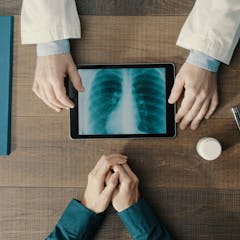
Articles on Cancer
Displaying 41 - 60 of 878 articles

Proton beam therapy is a precise form of radiation that can reduce the side-effects of cancer treatment. It is available around the world, but not in Canada.

An incapacitated King could potentially cause difficulties in Australia, and it would be wise for governments to enact legislation now to protect against it.

A cancer that spreads is much more dangerous. Here’s why – and how it happens.

People with low-risk prostate cancer are more likely to die from something else. Overdiagnosis and overtreatment can lead to life-changing complications.

Malignant melanoma affects 325,000 people worldwide each year.

Cachexia — significant loss of weight and muscle mass — has a massive impact on cancer outcomes and patient quality of life. The sooner it is detected, the better chance there is to manage it.

Radiotherapy takes many forms: from directing powerful high-energy beams toward specific areas of the body to placing radioactive seeds right next to tumors.

From helping surgeons to carry out complex procedures to monitoring the heartbeat of the chronically ill, the use of AI in cancer care is set to be game-changing.

People living in the poorest parts of England were at a more than 70% higher risk of dying from cancer compared to those living in more affluent areas.

From COVID-19 vaccines to cancer treatments and beyond, the flexibility of mRNA-based therapies gives them the potential to prevent and treat many types of diseases.

When just one of the thousands of microRNAs in people go awry, it can cause diseases ranging from heart disease to cancer.

People receiving cancer treatment can struggle to read. An innovative form of bibliotherapy brought joy and solace, enabling patients to concentrate as listeners, rather than readers.

About half of new mouth cancer diagnoses in the UK are detected late.

Climate change, inequality, the evolution of knowledge… Experts have been surveyed, and a consensus is emerging on what to expect from the effects of these factors in the medical field.

From math to evolutionary game theory, looking at cancer through different lenses can offer further insights on how to approach treatment resistance, metastasis and health disparities.

People with intellectual disability are 50% more likely to die from cancer than the general population.

Non-melanoma skin cancers have often been viewed as fairly benign. A new study undermines that view.

In this episode, Cheryl Thompson, author of ‘Beauty in a Box,’ untangles the roots of hair relaxers for Black women and discusses their potential health dangers and resulting hundreds of lawsuits.

Cancer screening and other routine primary care can help address inequities if we choose to leave the unfair status quo behind.

A marine sponge from Mauritius has shown potential as the source of compounds that kill liver cancer cells.





